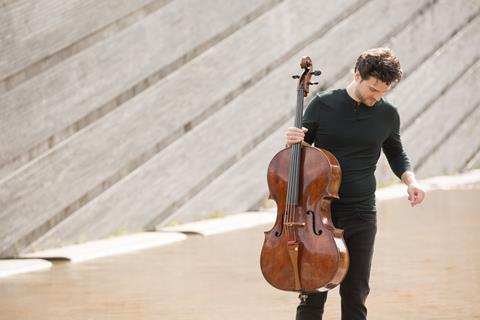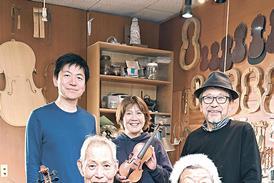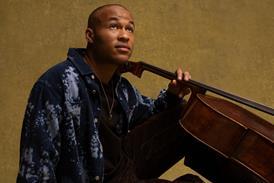The cellist makes a case for why this work should enjoy more time in the spotlight, ahead of a performance in Belfast on 12 January 2024

Discover more Featured Stories like this in The Strad Playing Hub
When did you first come across Bridge’s Concerto Elegiaco ‘Oration’? When did you first perform it?
I had known of the Bridge Concerto for quite some time but only truly discovered it when looking for a piece to pair with the Elgar Concerto for a recording. And what a discovery that was! It amazes me to this day that the work is not more widely performed as it is an incredibly gripping and powerful masterpiece. Since then I have been so taken by this music that I am commited to introducing audiences to the piece and take them on the intense journey that is ‘Oration’.
My first performance of it was actually in front of the microphone - the pandemic with its lockdowns and cancelled concerts had hit several months before the scheduled recording sessions and with that went all possibilities of performing the piece in public. What you hear on the recording is essentially the result of a lot of practice and study in isolation. That did however allow me to dive very deeply into the music and brought a special sense of focus to the preparation. Christopher Ward and I had met before the sessions to discuss ideas and play through the piece with him at the piano. That was my first time hearing the music in real life!
The recording sessions themselves in locked-down Vienna had an unsual intensity to them as none of us - the orchestra included - were able to perform publicly at the time. Being in the studio together therefore felt like an outlet for a lot of built up creative energy. Looking back, despite the challenges at the time, I would never have thought that a work on and against war would gain the tragic actuality it has in Europe right now.
Do you have advice to string players learning the work? What’s the trickiest section or technique for you in the piece, and how do you overcome it?
The Bridge Concerto as a whole is not a vituoso piece in which technical ability is on display in a traditional sense. There certainly are some tricky passages for which it helps to find good bowings and fingerings but the main challenge lies elsewhere: As the title suggests, the cello is tasked with being the orator, leading the prayer. The sound therefore needs to be incredibly expressive - lyrically singing and yet very rhetorical at the same time. Additionally, each of the episodes in the piece has a character of its own. It therefore requires a lot of control over articulation, bow speed, having the vibrato follow the impulse from the bow. I feel like making the sound truly speak probably is the lifelong quest of any string player - it certainly is mine!
Read: Frank Bridge’s Concerto Elegiaco ‘Oration’ – a listening guide by cellist Gabriel Schwabe
Review: Gabriel Schwabe: Elgar, Bridge
What’s the best part about performing this work?
The experience of playing this concerto is really quite unique. Bridge wrote it as a reaction to World War One, which he had not directly participated in but had lost friends to and it had deeply and personally affected him. The piece depicts the war in all its brutality - from drum fire to a merciless march and an eerie parade of ghosts raising from their graves. Throughout this, the cello is often pleading as if to remedy the unfolding tragedy, only to be literally overwhelmed and silenced by the orchestra. It’s the struggle of the individual against the cruel, relentless machine of war. It’s these moments of helplessness when the orchestra’s sound washes over me which feel most poignant and touching.
An interesting fact about the piece concerns the Epilogue: It was not originally part of the work but added to it around two months later. When I first learnt the concerto, it felt strange that it should end with an epilogue that doesn’t really bear any relationship with the rest of the concerto and felt so suddenly positive in D major. But when performing the piece, I immediately understood why Bridge felt it necessary to add it. The ending as originally intended is incredibly bleak and the heavenly melody introduced by the violins in the epilogue offers us a ray of sunshine and some hope for a better future, however fragile.
Tell us about the instrument you’re using in your upcoming performance in Belfast. Is it the same one you used in the 2021 recording?
It is the same Guarneri that I’ve been very fortunate to play for the past couple of years - a Giuseppe Guarneri ’filius Andreae’ cello made in Cremona c.1695. In fact, while I was in Vienna for the recording sessions for the Elgar and Bridge concertos, I recieved the call that a very generous family had acquired the instrument to loan it to me - this really was and continues to be a dream come true! I had always been attracted to Guarneri family instruments and this particular one possesses beauty of sound paired with an incredibly dense core - something I had always missed in my previous instruments. The cello had belonged to a very influential cellist and pedagogue and has a rich history attached to it, which is a privilege to now be a part of. In addition, being Cremonese making at its best, it’s breathtakingly beautiful to look at which doesn’t hurt.
Gabriel Schwabe will perform Bridge Cello Concerto ‘Oration’ with the Ulster Orchestra in Belfast on 12 January 2024. Find out more here.
Read: ‘Music is part of our existence, even under shell-fire’: String players of the Great War
Watch: Pablo Casals performs The Song of the Birds
Read more Featured Stories like this in The Strad Playing Hub
The number one source for playing and teaching books, guides, CDs, calendars and back issues of the magazine.
In The Best of Technique you’ll discover the top playing tips of the world’s leading string players and teachers. It’s packed full of exercises for students, plus examples from the standard repertoire to show you how to integrate the technique into your playing.
The Strad’s Masterclass series brings together the finest string players with some of the greatest string works ever written. Always one of our most popular sections, Masterclass has been an invaluable aid to aspiring soloists, chamber musicians and string teachers since the 1990s.
American collector David L. Fulton amassed one of the 20th century’s finest collections of stringed instruments. This year’s calendar pays tribute to some of these priceless treasures, including Yehudi Menuhin’s celebrated ‘Lord Wilton’ Guarneri, the Carlo Bergonzi once played by Fritz Kreisler, and four instruments by Antonio Stradivari.












































No comments yet